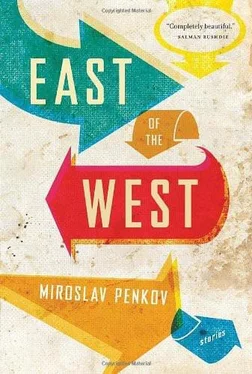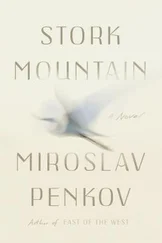Miroslav Penkov
East of the West
“My soul, your voyages have been your native land!”
— Nikos Kazantzakis, Odyssey: A Modern Sequel, Book XVI, line 959
I was born just twenty years after we got rid of the Turks. 1898. So yes, this makes me seventy-one. And yes, I’m grumpy. I’m mean. I smell like all old men do. I am a walking pain, hips, shoulders, knees and elbows. I lie awake at night. I call my daughter by my grandson’s name and I remember the day I met my wife much better than yesterday, or today. August 2, I think. 1969. Last night I pissed my bed and who knows what joy tonight will bring? I am in no way original or new. Although I might be jealous of a man who’s sixty years dead.
I found his letters to my wife, from long before she knew me, when she was still sixteen. It was a silly find, one that belongs in romance novels, not in real life and old age. I dropped her box of jewelry. The lid flew to the side and the door of a secret compartment popped loose at the bottom. Inside lay a small booklet, a diary in letters.
I can’t imagine ever writing the kind of letters a woman would preserve for sixty years. I wish it was not that man but I who’d known Nora, back when she was closer to a beginning than an end. Such is the simple truth — we’re ending. And I don’t want to end. I want to live forever. Reborn in a young man’s body and with a young man’s mind. But not my body and not my mind. I want to live again as someone who holds no memory of me. I want to be that other man.
•
For eight years now we’ve lived in this nursing home, a few kilometers away from Sofia, at the foot of the Vitosha Mountains. The view is nice, the air is fresh. It’s not so much that I don’t like it here. It’s more that I really hate it. The view and the air, the food, the water, the way they treat us like we’re all dying. The fact that we are all dying. But I suppose, if I’m honest to myself, which I rarely am, I should be glad we’re where we are. It was hard to take care of Nora on my own, after her stroke. We left the apartment to our daughter, recently married, already pregnant, packed up and settled down in prison.
Since then each day is like the one before. Six thirty we wake up for medication. We eat breakfast in the cafeteria — thin slices of buttered bread with three black olives, a sliver of yellow cheese, some linden tea. Dear God, I remember eating better during the Balkan War. I sit amidst a sea of trembling chins and shaking fingers and listen to the knocking of olive pits on metal plates. I talk to no one and no one talks to me. I’ve managed to earn this much. Then, after breakfast, I wheel Nora up to the gym. I watch her struggle to make a fist, to hold a rubber ball. I watch the nurses massage her withered arm and leg. I watch their supple arms and legs.
The second stroke left half of Nora paralyzed, and all of her mute. Most nurses — some doctors, even — regard her as mentally challenged. She’s far from that. I’m sure that in her mind all words ring clear, but they roll out disjoined, like baby talk. Sometimes I wish she’d keep the jabber to herself. Sometimes I am embarrassed by the way the nurses look at her, or me. It’s obvious by now she won’t miraculously learn to speak again. That part of her brain is ruined, the fuse has blown. So why can’t she keep quiet? She manages to say my name and Buryana’s, and if I do my best to vex her, sometimes she manages a curse. The rest is babble.
She babbles as I roll her back to our room or, if the day allows it, out in the garden, where we walk in circles. I like the garden only when the flowers bloom. All other times the earth is damp and black, and I cannot resist the ugly thoughts. When we’re tired we sit down on a bench and fall asleep, shoulder against shoulder, with the sun upon our faces, and to anyone looking, I’m sure we are a lovely sight.
Then lunch. Then the siesta. Our daughter comes to visit once a week, and sometimes she brings our grandson along. But lately, with all the trouble she’s had at home, she visits daily. She is awful company, my daughter. We leave little Pavel with his grandma, so she won’t get upset, and in the garden Buryana talks of how her husband is chasing after another woman. Dear Buryana, I, too, might get upset. But here I sit on the bench and listen, because I am your father. I have no way of helping, no word of sensible advice. Hang in there, fighter. You’ll be all right. Words mean so little, and I’m too worn out for deeds.
•
I am asleep and disconnected from what has been or is. Then I’m awake. It seems that someone has dropped a tray outside. The wind rattles the gutters, the trees creak and Nora breathes too loudly. I close my eyes. But what if someone drops another tray? What if Nora coughs or snores? I lie, anticipating sounds that might never sound, yet all the same keep me awake. It thunders over the mountain.
I put on my robe and sit by the window in Nora’s wheelchair. I switch on the small radio. Quiet music pours out of the speaker, and I listen in the blue of the night, until a voice comes up to read the late-night news. The Communist Party is great again, more jobs for the people, less poverty. Our magnificent Bulgarian wrestlers have earned us more gold. Good night, comrades, be safe in your sleep.
Dear God, I won’t be safe. There is no sleep. And I’m so very tired of the comrades, their all-encompassing belief in bright future days that somehow I’ve started to suspect might never come. I turn the dial until I find the muffled sound of a foreign station. Romanian, it seems. Then Greek. Then British. The voices crackle and buzz, because the Party is distorting the transmissions, but at least at night the voices are strong enough to hear. I listen to the English and all the words sound like a single long word to me, a word devoid of history and meaning, completely free. At night, the air is thicker, and one foreign sound drags after itself another and they converge into a river, which flows freely from land to land.
I travel with this river. But even so, how can I resist the current of my worries? I think of Buryana. How will she pay the bills, divorced and with a little child? How will Pavel grow up a man without a father? And then my eyes seek Nora, who snores lightly on her back. I watch her face, her wrinkled skin, her crooked lips, and I can’t help but think that she is pretty, still. A man ought to be able to undress his wife from all the years until she lies before him naked in youth again. Which makes me wonder if she ever lay naked for that other man, the one who wrote the letters. If he cupped her left breast in his palm. But it is Nora’s breast, and wasn’t he a man? Of course he cupped it.
I reach for the jewelry box and pry the bottom open. I take the little notebook and weigh it in my palm. Someone has scribbled on the cover— Dear Miss Nora, Mr. Peyo Spasov, in his last hour, asked us to mail this book to you . This is as far as I can read now. Mr. Peyo Spasov . It’s hard to think of a more ordinary name. He must have been a peasant, uneducated, ignorant and simple-minded. He must have earned his bread by plowing fields, by chopping wood and herding sheep. Most likely he spoke with a lisp, or stuttered. Most likely he walked hunched over from all the work.
It suddenly strikes me I’ve just described myself. Of course, I hate this other man, but what if he was not a peasant like me? What if he was a doctor’s son? I turn to the first letter and read.
February 5, 1905My dearest darling Nora. I’m freezing and my fingers hurt, but I don’t want to think of such things. I’m writing you a letter. We’re crossing the Pirin Mountains and tomorrow, if God decides, we will be in Macedonia. The Turks …
Читать дальше











